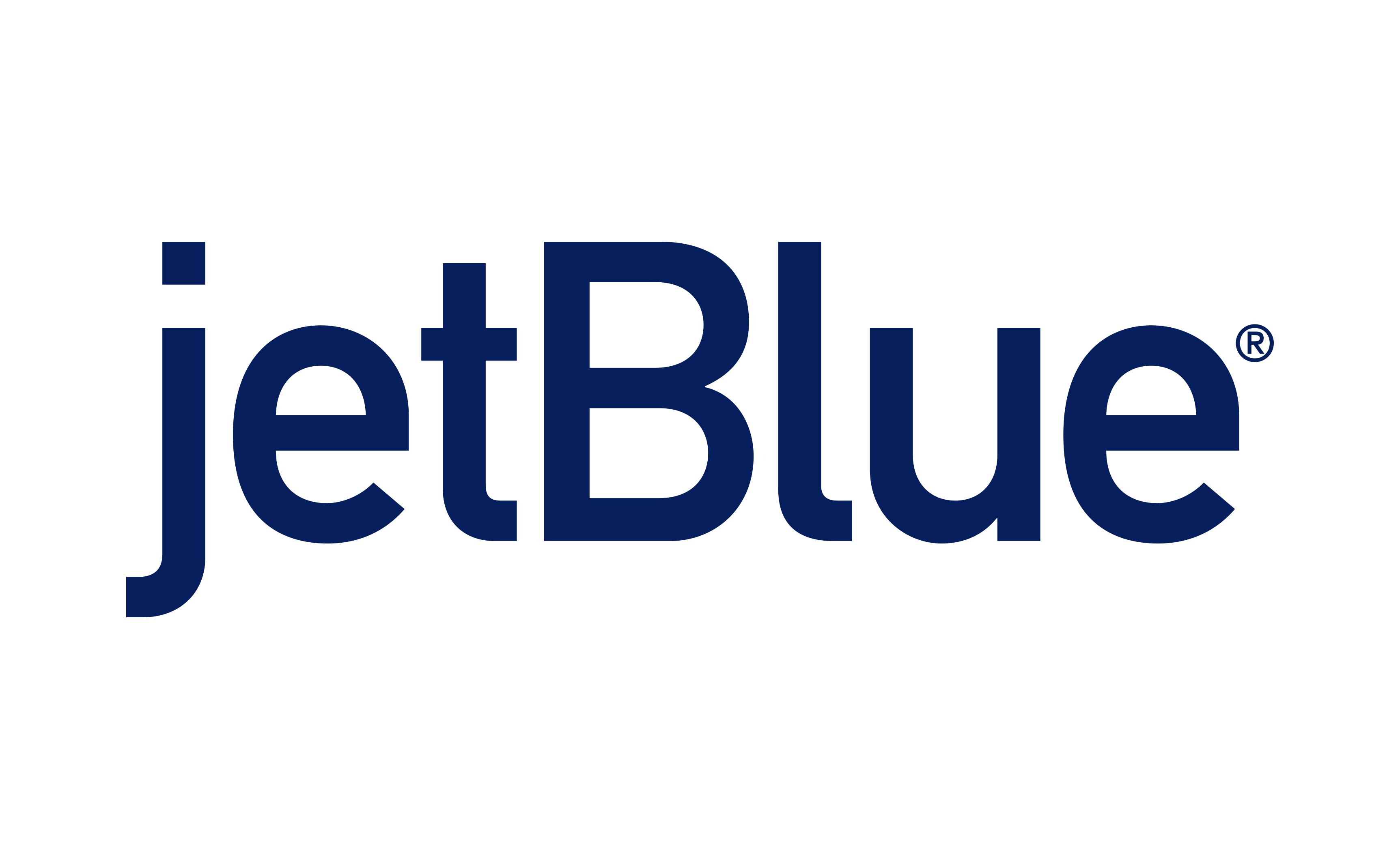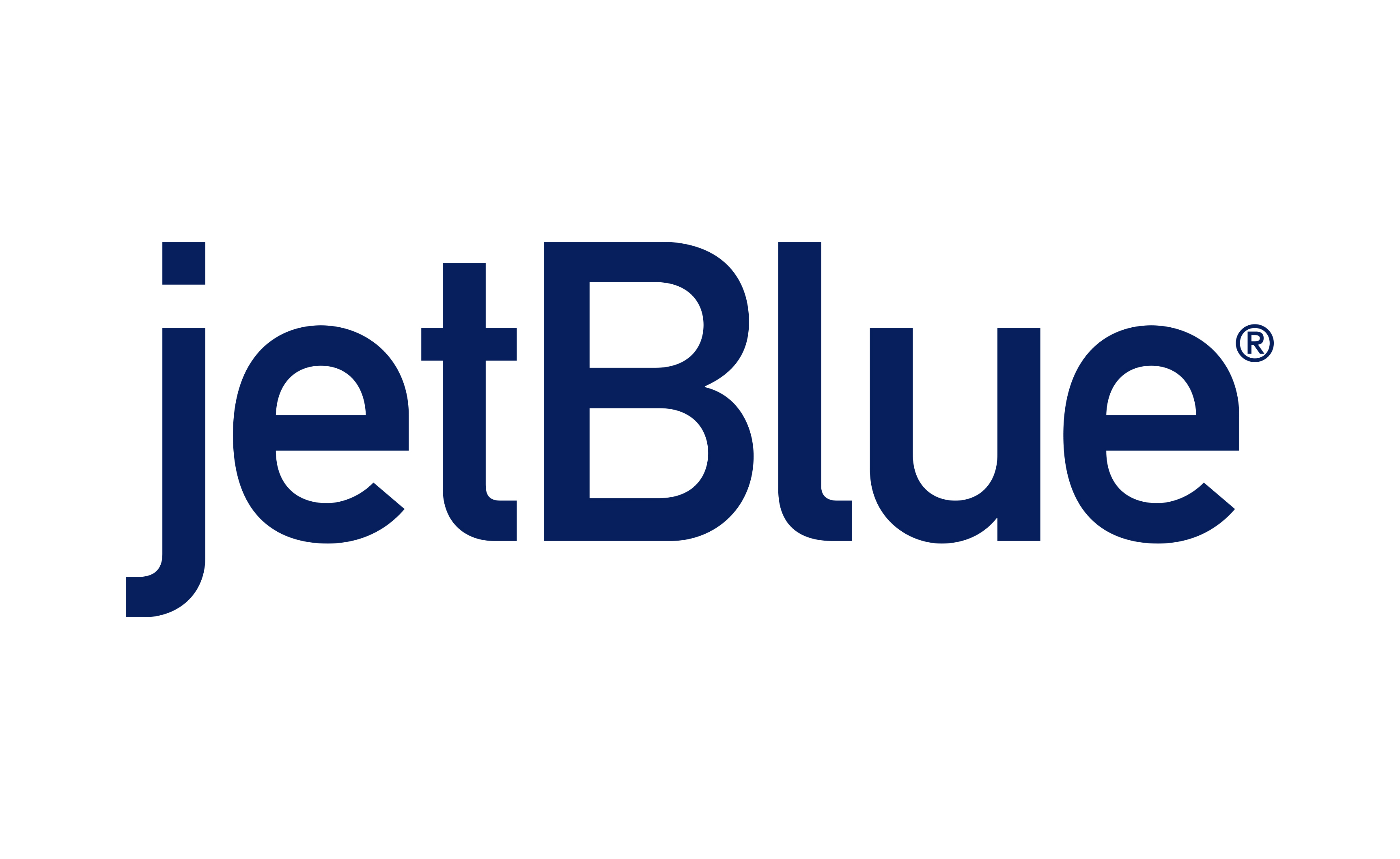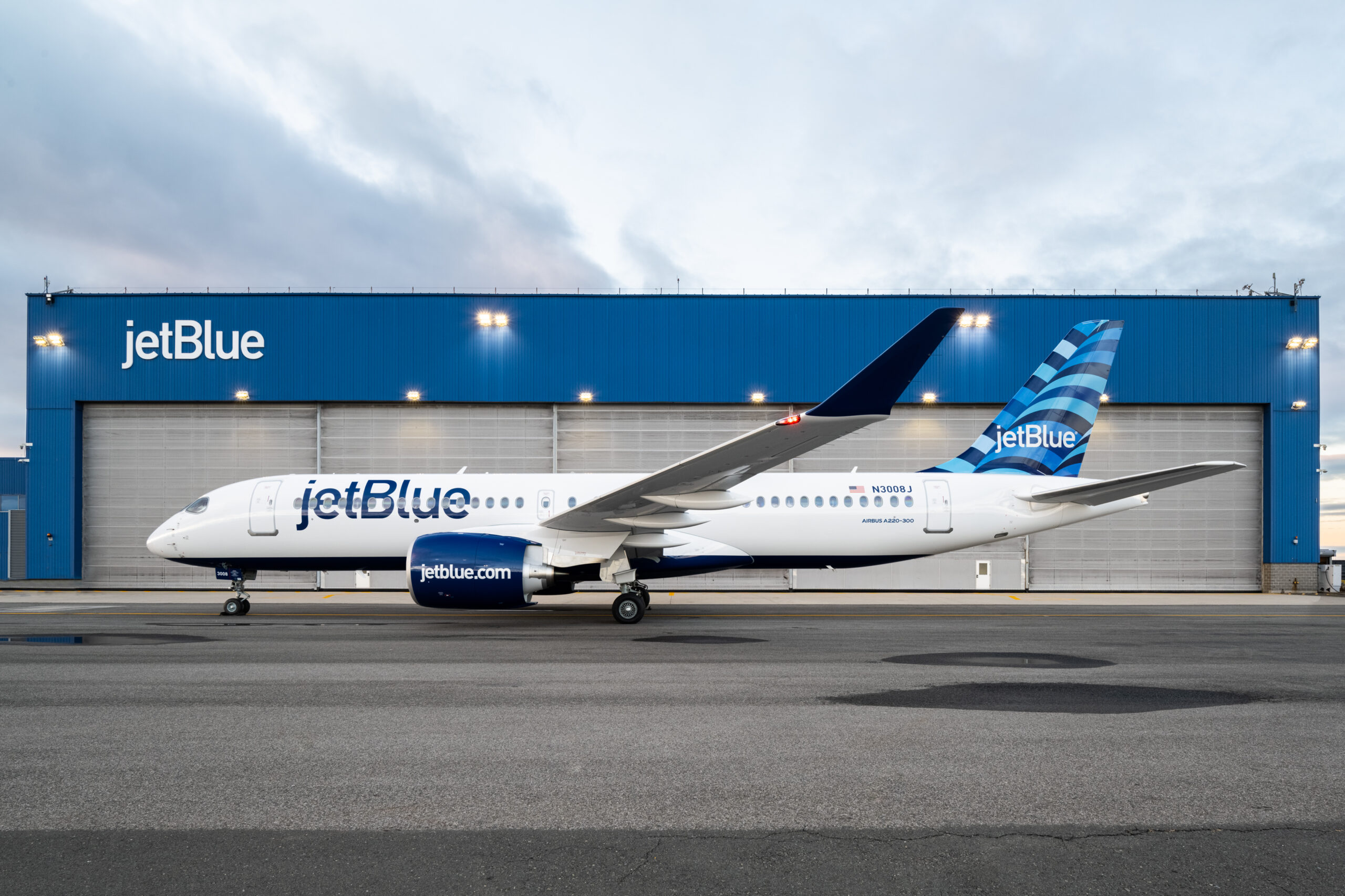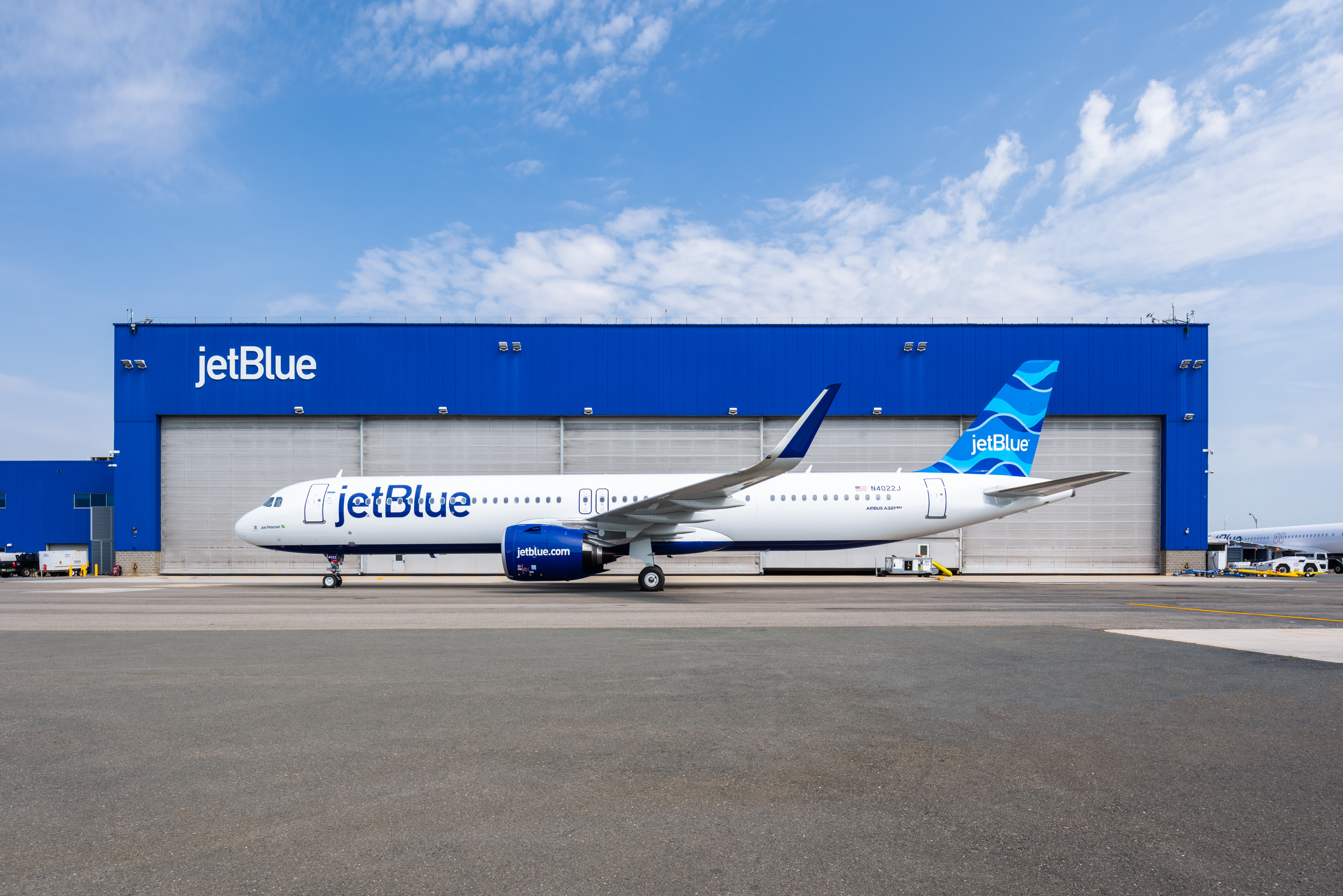JetBlue Airways Corporation Faces Financial Challenges

- Raymond James downgraded JetBlue Airways Corporation (NASDAQ:JBLU) to a "Market Perform" rating due to financial challenges.
- JetBlue anticipates a quarterly loss of $0.33 per share, a significant drop from the previous year's $0.08 profit per share.
- The airline is implementing cost-saving measures in response to weaker travel demand, making it unlikely to achieve break-even margins this year.
JetBlue Airways Corporation (NASDAQ:JBLU) is a major American low-cost airline, known for its affordable fares and customer-friendly services. The company operates primarily in the United States, with some international routes. JetBlue competes with other budget airlines like Southwest Airlines and Spirit Airlines. Recently, Raymond James downgraded JetBlue to a "Market Perform" rating, as reported by Benzinga, with the stock priced at $4.36 at the time.
JetBlue is preparing to release its second-quarter earnings results, with analysts predicting a quarterly loss of $0.33 per share. This is a significant drop from the $0.08 profit per share reported in the same period last year. The anticipated revenue is $2.29 billion, a decrease from $2.43 billion a year ago. These figures suggest a challenging financial period for the airline.
CEO Joanna Geraghty has communicated to employees that JetBlue is implementing cost-saving measures due to weaker travel demand. This situation makes it unlikely for the airline to achieve break-even margins this year. The company's stock price reflects these challenges, closing at $4.36, a slight decline of 0.5% from the previous day.
JetBlue's stock has experienced fluctuations, trading between $4.31 and $4.41 today. Over the past year, the stock has seen a high of $8.31 and a low of $3.34. The current market capitalization of JetBlue is approximately $1.54 billion. Today's trading volume on the NASDAQ exchange is 13,496,594 shares, indicating active investor interest despite the company's financial hurdles.
| Symbol | Price | %chg |
|---|---|---|
| LTM.SN | 23.33 | 0 |
| 003495.KS | 24000 | 0.42 |
| 003490.KS | 23600 | -0.64 |
| GIAA.JK | 72 | 1.39 |

JetBlue Airways Corporation's Stock Performance and Industry Outlook
- JetBlue Airways Corporation (NASDAQ:JBLU) maintains a steady stock consensus target price despite challenges in the airline industry.
- The strategic partnership with American Airlines and the potential to surpass earnings estimates highlight opportunities for JetBlue.
- Analyst Duane Pfennigwerth sets a bullish price target of $13 for JetBlue, indicating optimism for its stock performance.
JetBlue Airways Corporation (NASDAQ:JBLU) is a major player in the airline industry, known for its low-cost travel options and customer-friendly services. The company operates primarily in the United States, with a focus on the Northeast region. JetBlue's strategic partnership with American Airlines Group Inc. aims to enhance connectivity for travelers, potentially boosting its market presence. However, the airline industry faces challenges such as fluctuating fuel prices and changing travel demand, impacting JetBlue's stock performance.
Over the past year, JetBlue's stock consensus target price has seen a notable shift. Last month, the average price target was $3, consistent with the previous quarter. This stability suggests that analysts have maintained a steady outlook on the stock in the short term. However, a year ago, the average price target was significantly higher at $5.53, indicating a substantial decrease in analysts' expectations. This decline reflects potential challenges in the airline industry and JetBlue's financial performance.
JetBlue is preparing to release its earnings on July 29, 2025. Historically, the airline's stock has experienced negative one-day returns following earnings announcements in 80% of cases over the past five years. Despite this trend, JetBlue is anticipated to surpass earnings estimates in its upcoming report, as highlighted by Zacks. Analyst Duane Pfennigwerth from Evercore ISI has set a price target of $13 for JetBlue, suggesting potential for the stock to move higher.
The airline industry has seen a surge in demand for premium seats, as highlighted by Delta Air Lines' record revenues for the second quarter. This shift in consumer preference has resulted in capacity cuts for economy class, while the premium segment continues to thrive. Delta's positive financial performance has had a ripple effect on airline stocks, including JetBlue, which is experiencing a bounce in its stock price. This positive momentum in the airline industry is likely to have a favorable impact on JetBlue's stock.
Despite the challenges faced by the airline industry, JetBlue's strategic partnership with American Airlines and its potential to surpass earnings estimates offer a glimmer of hope for investors. Analyst Duane Pfennigwerth's price target of $13 reflects optimism in JetBlue's potential amidst evolving market dynamics. Investors should monitor upcoming earnings reports and industry developments for further insights into JetBlue's stock performance.

UBS Starts JetBlue at Sell Ahead of Q2 Earnings Report
UBS initiated coverage on JetBlue Airways Corporation (NASDAQ:JBLU) with a Sell rating and a $3 price target, warning that despite potential Q2 outperformance, the airline faces significant challenges sustaining momentum into the second half of 2025 and beyond.
The analysts acknowledged that JetBlue’s conservative Q2 guidance could set the stage for a slight beat, with revenue declines modeled at -6.0% year-over-year versus the consensus of -6.4%. Recent share gains at LaGuardia, boosted by competitive dynamics at Newark, and strong Memorial Day travel trends likely supported results in June. UBS forecasts Q2 EPS of -$0.31, a bit better than the Street’s -$0.34 estimate.
However, the firm flagged persistent headwinds ahead: weak revenue per available seat mile (RASM), elevated costs (CASM-ex estimated to rise 6.5%), and limited near-term catalysts to drive a sustained earnings recovery. UBS projects ongoing quarterly losses through this year, with only modest EBIT-level profitability possible next year—but only if revenue metrics accelerate meaningfully.
Given these hurdles, UBS believes the risk-reward profile skews negative, as a steep ramp in revenue performance would be needed for JetBlue to meet profit targets, a scenario it sees as unlikely under current market conditions.

JetBlue Airways Corporation's Stock Performance and Strategy Update
- Susquehanna updated its rating for JetBlue Airways Corporation (NASDAQ:JBLU) to Neutral, with a current stock price of $6.01.
- JetBlue announced a decrease in available seat miles (ASM) by 2-5% for Q1 2025, leading to a significant stock price drop.
- The company introduced a new strategy, JetForward, aiming for profitability despite a smaller-than-expected loss in Q4 2024.
JetBlue Airways Corporation, traded on the NASDAQ under the symbol JBLU, is a major American low-cost airline. On January 28, 2025, Susquehanna updated its rating for JetBlue (NASDAQ:JBLU) to Neutral, advising investors to hold the stock. At that time, the stock price was $6.01, as highlighted by Benzinga. This rating comes amid significant fluctuations in JetBlue's stock performance.
JetBlue's share price recently dropped over 25% to $6, despite the company announcing better-than-expected earnings. This decline is attributed to a warning about reduced capacity in the first quarter of 2025. JetBlue anticipates a decrease in available seat miles (ASM) by 2-5% compared to the previous year, with ASM expected to remain flat throughout the year.
CEO Joanna Geraghty introduced a new strategy called JetForward, aiming to return the airline to profitability. She described the revenue environment as "healthy" and expressed confidence in achieving a positive operating margin for the full year. Despite challenges, JetBlue reported a smaller-than-expected loss for the fourth quarter of 2024, with an adjusted loss per share of $0.21, better than Wall Street's forecast of $0.31.
JetBlue's revenues for the fourth quarter amounted to $2.28 billion, a 2.1% decrease year over year, yet surpassing the Street's estimate of $2.25 billion. However, the company's projection of higher costs for 2025 than initially anticipated has raised concerns among investors. This announcement led to a significant decline in the company's stock, with shares dropping by 14% during morning trading.
JetBlue's market capitalization stands at approximately $2.08 billion, with a trading volume of 121,004,382 shares. The stock has fluctuated between a low of $5.75 and a high of $6.98 during the day. Over the past year, the stock has reached a high of $8.31 and a low of $4.50. Despite the challenges, JetBlue remains focused on its strategy to improve financial performance.

JetBlue Airways Corporation's Financial Performance and Future Strategies
- JetBlue Airways Corporation (NASDAQ:JBLU) reported an EPS of -$0.21, surpassing estimates and indicating potential for recovery despite current challenges.
- The airline's strategic adjustments, including cost-reduction efforts and the JetForward strategy, aim to navigate through financial difficulties and improve profitability.
- Despite a negative P/E ratio and significant debt levels, JetBlue's revenue growth forecast and liquidity suggest cautious optimism for the company's future.
JetBlue Airways Corporation, listed as NASDAQ:JBLU, is a major American low-cost airline headquartered in New York City. It operates over 1,000 flights daily and serves 100 domestic and international network destinations. Despite its size, JetBlue faces stiff competition from larger airlines like Delta and United, which have stronger pricing power and higher revenue growth forecasts.
On January 28, 2025, JetBlue reported an earnings per share (EPS) of -$0.21, surpassing the estimated EPS of -$0.42. The company also reported revenue of approximately $2.28 billion, exceeding the estimated $2.24 billion. Despite these better-than-expected results, JetBlue's share price dropped over 25% to $6, as highlighted by CNBC, due to concerns about reduced capacity and increased costs.
CEO Joanna Geraghty described the first quarter as a "trough quarter," indicating a period of lower performance. She introduced the JetForward strategy to drive future growth and profitability. Despite a healthy revenue environment, JetBlue anticipates a decrease in available seat miles (ASM) by 2-5% compared to the previous year, with ASM expected to remain flat throughout 2025.
JetBlue's financial metrics reveal challenges. The company has a negative price-to-earnings (P/E) ratio of -2.39, indicating ongoing losses. Its price-to-sales ratio is 0.22, and the enterprise value to sales ratio is 0.89, reflecting market valuation concerns. The debt-to-equity ratio of 3.34 shows significant debt levels, while a current ratio of 1.21 suggests reasonable liquidity.
To address these challenges, JetBlue is implementing cost-reduction strategies, including eliminating unprofitable routes and deferring aircraft. The company also offers voluntary early retirement packages to senior pilots. Despite setbacks from losing two antitrust cases, JetBlue aims for 2025 revenue growth between 3% and 6% with flat capacity, focusing on higher-priced seats to boost revenue.

JetBlue Airways Corporation's Stock Performance and Strategy Update
- Susquehanna updated its rating for JetBlue Airways Corporation (NASDAQ:JBLU) to Neutral, with a current stock price of $6.01.
- JetBlue announced a decrease in available seat miles (ASM) by 2-5% for Q1 2025, leading to a significant stock price drop.
- The company introduced a new strategy, JetForward, aiming for profitability despite a smaller-than-expected loss in Q4 2024.
JetBlue Airways Corporation, traded on the NASDAQ under the symbol JBLU, is a major American low-cost airline. On January 28, 2025, Susquehanna updated its rating for JetBlue (NASDAQ:JBLU) to Neutral, advising investors to hold the stock. At that time, the stock price was $6.01, as highlighted by Benzinga. This rating comes amid significant fluctuations in JetBlue's stock performance.
JetBlue's share price recently dropped over 25% to $6, despite the company announcing better-than-expected earnings. This decline is attributed to a warning about reduced capacity in the first quarter of 2025. JetBlue anticipates a decrease in available seat miles (ASM) by 2-5% compared to the previous year, with ASM expected to remain flat throughout the year.
CEO Joanna Geraghty introduced a new strategy called JetForward, aiming to return the airline to profitability. She described the revenue environment as "healthy" and expressed confidence in achieving a positive operating margin for the full year. Despite challenges, JetBlue reported a smaller-than-expected loss for the fourth quarter of 2024, with an adjusted loss per share of $0.21, better than Wall Street's forecast of $0.31.
JetBlue's revenues for the fourth quarter amounted to $2.28 billion, a 2.1% decrease year over year, yet surpassing the Street's estimate of $2.25 billion. However, the company's projection of higher costs for 2025 than initially anticipated has raised concerns among investors. This announcement led to a significant decline in the company's stock, with shares dropping by 14% during morning trading.
JetBlue's market capitalization stands at approximately $2.08 billion, with a trading volume of 121,004,382 shares. The stock has fluctuated between a low of $5.75 and a high of $6.98 during the day. Over the past year, the stock has reached a high of $8.31 and a low of $4.50. Despite the challenges, JetBlue remains focused on its strategy to improve financial performance.

JetBlue Airways Corporation's Financial Performance and Future Strategies
- JetBlue Airways Corporation (NASDAQ:JBLU) reported an EPS of -$0.21, surpassing estimates and indicating potential for recovery despite current challenges.
- The airline's strategic adjustments, including cost-reduction efforts and the JetForward strategy, aim to navigate through financial difficulties and improve profitability.
- Despite a negative P/E ratio and significant debt levels, JetBlue's revenue growth forecast and liquidity suggest cautious optimism for the company's future.
JetBlue Airways Corporation, listed as NASDAQ:JBLU, is a major American low-cost airline headquartered in New York City. It operates over 1,000 flights daily and serves 100 domestic and international network destinations. Despite its size, JetBlue faces stiff competition from larger airlines like Delta and United, which have stronger pricing power and higher revenue growth forecasts.
On January 28, 2025, JetBlue reported an earnings per share (EPS) of -$0.21, surpassing the estimated EPS of -$0.42. The company also reported revenue of approximately $2.28 billion, exceeding the estimated $2.24 billion. Despite these better-than-expected results, JetBlue's share price dropped over 25% to $6, as highlighted by CNBC, due to concerns about reduced capacity and increased costs.
CEO Joanna Geraghty described the first quarter as a "trough quarter," indicating a period of lower performance. She introduced the JetForward strategy to drive future growth and profitability. Despite a healthy revenue environment, JetBlue anticipates a decrease in available seat miles (ASM) by 2-5% compared to the previous year, with ASM expected to remain flat throughout 2025.
JetBlue's financial metrics reveal challenges. The company has a negative price-to-earnings (P/E) ratio of -2.39, indicating ongoing losses. Its price-to-sales ratio is 0.22, and the enterprise value to sales ratio is 0.89, reflecting market valuation concerns. The debt-to-equity ratio of 3.34 shows significant debt levels, while a current ratio of 1.21 suggests reasonable liquidity.
To address these challenges, JetBlue is implementing cost-reduction strategies, including eliminating unprofitable routes and deferring aircraft. The company also offers voluntary early retirement packages to senior pilots. Despite setbacks from losing two antitrust cases, JetBlue aims for 2025 revenue growth between 3% and 6% with flat capacity, focusing on higher-priced seats to boost revenue.







